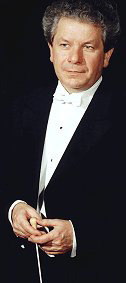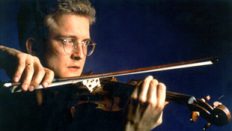Belohlavek keeps NSO in Czech
Saturday April 21, 2007
____________________________________________________________

The Washington Post 4/21/07: Czech music isn't in especially short supply around town. Janacek and Martinu show up regularly to add a dash of Mitteleuropean spice to the menu, and Dvorak's "New World" Symphony seems to romp exuberantly through town a couple of times a year. But it was a rare pleasure on Thursday to hear nearly an entire evening devoted to Czech music performed by none less than Jiri Belohlavek -- the preeminent Czech conductor of his generation -- leading the National Symphony Orchestra, with the gifted Christian Tetzlaff on violin.
Belohlavek, who's headed the Prague Symphony, the Czech Philharmonic and the Prague Philharmonia, has been an imaginative promoter of Czech music for decades, dishing up chestnuts like Smetana's "Ma Vlast" when necessary, but often unearthing less familiar works that warrant more attention.
Tetzlaff, a German violinist, plays with stern, merciless intelligence, considerable amounts of which he brought to Mozart's Violin Concerto No. 3 in G, K. 216. Though the work was written when the composer was still a teenager, there is no doubting its maturity; it is challenging music on every level, and Tetzlaff turned in a deeply considered reading that never flagged for a moment. It's hard to be too critical; Tetzlaff's sound is so warm and golden that it makes your ears glow, and the lyrical Adagio sang with rare beauty.
But the concluding Rondo, with its astonishing, near-magical mix of pathos and playful humor, fell disappointingly flat -- an unsmiling account that was easy to admire but hard to love.
The Shakespeare connection returned again after intermission, this time in Smetana's symphonic poem "Richard III." If you've never heard it, lucky you: ungainly, lead-footed and thoroughly unlikable, it's 13 minutes of tedious bombast -- roughly comparable to being banged in the head with frying pans, but without the redeeming esthetic value.
 Fortunately Tetzlaff stepped back into the fray to play Leos Janacek's Concerto for Violin and Orchestra. Known as "The Wandering of a Little Soul," it's a bit of an orphan; Janacek started to sketch it out in the mid-1920s but ended up incorporating the music into his opera "From the House of the Dead," where it remained for decades.
Fortunately Tetzlaff stepped back into the fray to play Leos Janacek's Concerto for Violin and Orchestra. Known as "The Wandering of a Little Soul," it's a bit of an orphan; Janacek started to sketch it out in the mid-1920s but ended up incorporating the music into his opera "From the House of the Dead," where it remained for decades.But in the late 1980s, the composers Leos Faltus and Milos Stedron disinterred the original music and rebuilt it as a one-movement symphonic poem. And to judge by Tetzlaff's high-voltage performance, it's a brilliant addition to the Janacek catalogue. From the gripping, military violin-and-drums opening to the slashing, searing final notes, Tetzlaff played with a fiery intensity so impassioned and insightful that it left the audience stunned for several moments -- before breaking into wild applause.
Belohlavek brought Smetana back to close out the evening, in a deeply satisfying account of "The Moldau" -- the second (and probably most loved) of the six symphonic poems that make up "Ma Vlast." Belohlavek's conducting had been impressive all evening, with a superb command of the orchestral palette and an incisive sense of phrasing, but this was a "Moldau" to remember: soaring, transcendent and as lovingly evocative of the Czech landscape as anything ever written.


Reader Comments